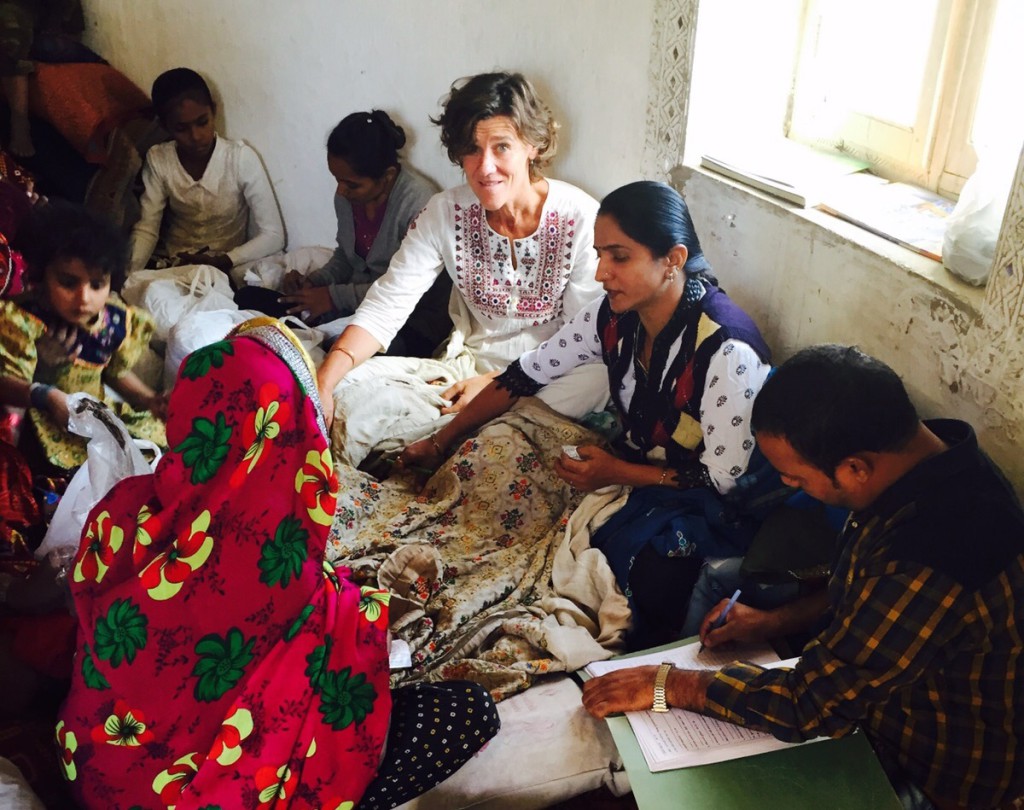Sanya just made a phone call to Kaki, the founder of Shrujan. Sanya is eager to get more work and she hopes that Kaki (83) will soon give her another saree to embroider. Shrujan is a social business in Kutch India. Last week I worked with them to strengthen the organization and improve their sales to provide women like Sanya with sufficient work. Shrujan fabricates and sells embroidered garments, cushions, bags, shawls throughout India in their own three shops, through various exhibitions all over India and online.
Getting the management team in position
The managers feel responsible for their jobs in sales, production and finance and have developed good systems to track production and sales figures. However, they hardly used these figures in their management decisions. Most information was directly passed on to Kaki and her daughter Ami. So, we focussed on bringing the managers in position as Management Team and strengthening teamwork. Everybody learnt how to handle assignments, we developed shared objectives and we outlined a collective strategy on how to achieve these. The team experienced the power of shared responsibility and learnt how to take decisions collectively. Monthly meetings will become their routines from now onwards.
Full focus on sales
Currently, Shrujan has high stock levels. Therefor it was decided to temporarily stop the production of garments. In order to keep providing artisans with work, only patches for cushions and panels will be taken into production. The team will also improve the designs of garments. Ami will take up the responsibility of getting it organised. It was decided to organise a “design week” three times a year, during which designers will be invited to the new museum / craft centre and sit together with artisans and sales people from Shrujan to develop fashionable garments with new embroidery designs. New targets were set for increasing sales through existing and new webshops. It was also decided to move the shop in Mumbai to a new location.
Inspire, coach and motivate
In our last meeting Ami gave me the following feedback: “It really helps me to sit with you and reflect on the way we have organized ourselves. The workshops and discussions helped to see what was missing, how miscommunication made our work in-efficient and how we can strengthen our teamwork. Our staff loves your attention, as they get a chance to raise their insights and experiences and feel they are taken seriously. Personally I realise I have to take up my role as director better by giving clear directions and assignments. But can I also please do the design work now and then, as it gives me great pleasure?”
Sanya, loyal artisan for Shrujan since 28 years
To get a better understanding about the whole production chain, we went to the village of Sanya. Sanya has worked as an artisan in embroidery for Shrujan since 1987. Since last year she is part of a group of artisans that works for around 4-5 hours per day. She is proud to be part of this group and the quality of embroidery they produce. She enjoys the income which has grown this year with 20% to a RS 3500 per month. It enables her to pay for the education of her grandchild and for household expenses.
Safeguarding unique crafts from Kutch
Currently 3,900 women like Sanya earn an income through Shrujan. Besides, Shrujan helps to safeguard and keep alive the unique embroidery arts and stitching techniques of Kutch societies. To do so, a museum / craft centre is built with the aim to promote art and stimulate entrepreneurship. It is planned to be opened next month.
Kaki asked Sanya if she could please work on the production of panels that can be sold at the new museum. Sanya and all other artisans will be invited to the opening ceremony. The artisans really count for Shrujan and are at the heart of their business!
Annet van den Hoek


